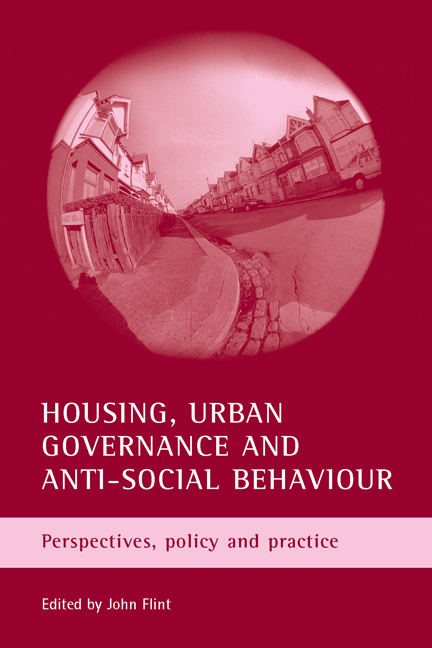Book contents
- Frontmatter
- Contents
- List of tables, figures and photographs
- Acknowledgements
- Notes on contributors
- Introduction
- Part 1 The definition and construction of anti-social behaviour in the UK
- Part 2 Legal techniques and measures utilised by social landlords to address anti-social behaviour
- Part 3 The emerging mechanisms of addressing anti-social behaviour in housing governance
- Part 4 Studies of housing and anti-social behaviour from an international perspective
- Index
eight - Social landlords, anti-social behaviour and countermeasures
Published online by Cambridge University Press: 15 January 2022
- Frontmatter
- Contents
- List of tables, figures and photographs
- Acknowledgements
- Notes on contributors
- Introduction
- Part 1 The definition and construction of anti-social behaviour in the UK
- Part 2 Legal techniques and measures utilised by social landlords to address anti-social behaviour
- Part 3 The emerging mechanisms of addressing anti-social behaviour in housing governance
- Part 4 Studies of housing and anti-social behaviour from an international perspective
- Index
Summary
Introduction
The rising tide of counter-anti-social behaviour (ASB) legislation and the continuing salience of the issue in political and media debates in part reflect how unruly and yobbish behaviour blights some local communities. However, the prominence of ASB as a ‘national problem’ is also symptomatic of the government's emphasis on communitarian approaches to social policy more generally (Driver and Martell, 2002; Martell et al, 2004) and an associated inclination to ‘talk up’ the issue as one demanding firm official countermeasures.
The increasing prominence of countering ASB as a social landlord activity raises issues about the role of the housing manager as a key agent of crime and social control. As demonstrated in Chapter Seven (this volume), social landlords have acquired a growing range of legal powers to help tackle ASB. The main purpose of this chapter is to review the research evidence on how social landlords make use of legal measures, including repossession and Antisocial Behaviour Orders (ASBOs), and non-legal measures, including mediation and Acceptable Behaviour Contracts (ABCs); and organise their approaches, for example, establishing specialist teams, in order to tackle ASB.
The material presented here provides empirical evidence drawn mainly from the authors’ recent work for the Office of the Deputy Prime Minister (ODPM), the ‘ODPM study’ (Pawson et al, 2005) and for the Scottish Executive (DTZ Pieda Consulting and Heriot- Watt University, 2005), although we also refer to research evidence from other studies.
The chapter begins by reviewing debates about the connection between social housing and ASB and about the specific relevance of ASB to social landlords (see also Chapters Two, Three and Five, this volume). We then examine the definitions of ASB and assess the evidence about the extent to which ASB is a growing phenomenon. The chapter continues by examining social landlords’ practices in countering ASB, looking in turn at changing approaches to the organisation of counter-ASB action and how legal and non-legal measures are used in practice. We conclude by offering observations about the themes emerging from the evidence and identify arising questions posed for policy makers and for social landlords.
Defining anti-social behaviour: a social landlord Perspective
As Chapters Three and Seven in this volume discuss, the concept of ASB has no commonly agreed definition and therefore comprises a very wide range of phenomena.
- Type
- Chapter
- Information
- Housing, Urban Governance and Anti-Social BehaviourPerspectives, Policy and Practice, pp. 155 - 176Publisher: Bristol University PressPrint publication year: 2006



